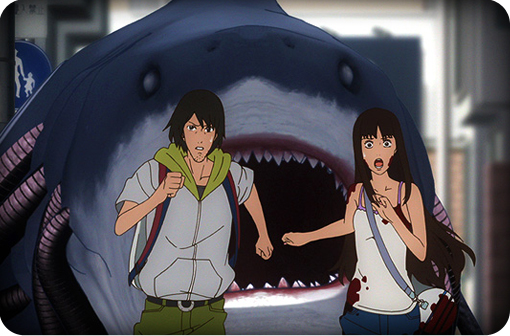 In 2012, Ufotable adapted Junji Ito’s legendary manga into a 70 minute OVA.
In 2012, Ufotable adapted Junji Ito’s legendary manga into a 70 minute OVA.
As in the comic, millions of fish suddenly sprout legs and start migrating inland, causing massive destruction. It’s a silly story, but Ito found a way to make it creepy and compelling, and Ufotable doesn’t deviate far from his plot. All the basic points are touched upon briefly – often too briefly (Brevity is the soul of wit, but it’s the soul of laziness, too), and while a different take on the manga might have been ideal, I’m glad they did this. The few times they take the story in a new direction are nearly enough to ruin the entire movie.
There’s lots of fanservice here. Lots of animated bouncing breasts and heroines tripping over so we can see their panties. This is all wrong – Ito’s comics aren’t about cockteasing T&A crap. It disrupts the atmosphere, and takes things to the level of a western horror film. You start wondering when the guy in the hockey mask will show up.
They switched the genders of the main characters, presumably so they could show a nubile young girl getting molested by a giant octopus. The male character Tadashi is now a fifth wheel. He has no purpose in the story because Kaori is now Princess Peach and Mario rolled into one, simultaneously a damsel in distress and a plucky heroine. They also added some secondary female characters who provide T&A and are generally of no import to the story.
A lot of stuff seems awfully rushed, and things that were lingered on unpleasantly. The two chapters in the circus were my favourite part of Gyo, a trippy interlude that reveals things might actually be worse than anyone could ever imagine. But they come across awkwardly in the movie, and it wouldn’t have hurt if they’d been scrapped. The business with Dr Koyanagi is handled pretty shittily as well, and a dark and interesting character becomes an annoying Dr Phibes.
There’s some effective scenes. Kaori carrying an injured friend up a staircase with a giant walking shark charging up the stairs behind her, with the shark kept out of the frame so that we don’t know how far away it is…that’s a spectacularly effective shot, and my heart rate increases every time I see it. Junji Ito has lamented that you cannot easily control pacing in comics, cannot decide how fast the reader experiences the action, and Takayuki Hirao seems keen to show that he is under no such limitation. The special effects are pretty good, and seeing all those walking fish running around Okinawa was nice.
But the soul of Gyo went missing in the transfer. There’s none of the comic’s sense of the absurd made palpable and real. The movie feels campy and trite, and not very scary. The comic had a dense atmosphere. Ultimately the Gyo Anime serves as an exercise in how to adapt a comic almost flawlessly – and yet, somehow, not truly adapt any of it at all.
No Comments »
 Chyna’s autobiography is part of one of publishing’s more inexplicable trends: the sudden rush of pro-wrestling tell-all books. In the late 90s it seemed that everyone who stepped inside the WWF offices short of the pizza delivery guy was suddenly writing a book about it. The Rock published an autobiography…in 2000. Imagine that, writing your autobiography when you’re 27. It’s like if Steven Spielberg wrote his career retrospective after making Jaws in 1975.
Chyna’s autobiography is part of one of publishing’s more inexplicable trends: the sudden rush of pro-wrestling tell-all books. In the late 90s it seemed that everyone who stepped inside the WWF offices short of the pizza delivery guy was suddenly writing a book about it. The Rock published an autobiography…in 2000. Imagine that, writing your autobiography when you’re 27. It’s like if Steven Spielberg wrote his career retrospective after making Jaws in 1975.
As a general rule, wrestlers should not write tell-all books unless they’re about five years removed from the sport (and McMahon’s chequebook). Otherwise, you get weak, not-very-shocking accounts by people who promise to spill the beans and dish the dirt…but not all the beans, and not very much of the dirt. They’ve got to stay in the WWF/WWE’s good books because, hey, McMahon still might call and offer them another payday.
Chyna breaks the rule, with this book being written just one year after winning the WWF Intercontinental Championship, but it’s fairly interesting as these books go. We learn about her early life, beauty pageants, various odd jobs, how she got discovered, her quest to find breast implants that won’t rupture in the ring, and her shitty dad. If you want bitterness and bad-mouthing, there’s a lot of it here. If you listen closely, you can hear the sound of a hundred bridges burning. Wrestlers are usually all too willing to sling mud at each other, just so long as they don’t insult the federation.
There’s lots of photos, and some stories contributed by Triple H and Mick Foley. Mostly the book hits all the expected spots for a sports tell-all book, and it’s (ghost)written well. This is coming from someone who’s not a super huge fan of pro wrestling. I follow it like I follow the UFC – that is, I only follow the freaks and the misfits. It’s a credit to this book that it remains accessible to someone like me, sitting in the cheap seats.
It has one big weakness, and it’s the same thing you could say about Dwayne Johnson’s book – it came too soon. Obviously there was a cash cow to milk, but what would this book have looked like if it was published 10 years later? It would cover the termination of her contract, her sex tape, her substance abuse problems, her adult entertainment career – a story or two there, no? But that’s getting a bit too sordid, and the book would end on a depressing note. It is difficult to sell a story about female empowerment when your latest industry accomplishment is a movie called Backdoor to Chyna.
But if you want to get picky, Chyna’s porn career officially started with Chyna Fitness in 2000, which has Chyna doing circuit training while the camera zooms in on her cleavage. Towards the end I became convinced that it was a porn video masquerading as a workout tape, and my view hasn’t changed since then. Seriously, if you have a market of muscle fetishists to exploit and you don’t want to look too obviously sleazy, what do you do? It’s like Japan’s “Soaplands”, where women oil you up and molest you, and the business skirts legal arbitration by claiming it’s a massage parlour.
No Comments »
 This comic is a series of 4-10 page shorts, re-telling Brothers Grimm and Hans Christian Andersen fairytales with disturbing guro violence. I was surprised to learn which side of the Sea of Japan it comes from. China has never been known for grotesque horror and transgression – their art normally seeks edification and austerity.
This comic is a series of 4-10 page shorts, re-telling Brothers Grimm and Hans Christian Andersen fairytales with disturbing guro violence. I was surprised to learn which side of the Sea of Japan it comes from. China has never been known for grotesque horror and transgression – their art normally seeks edification and austerity.
I haven’t read the full thing and I probably never will, because the group scanlating this thing abandoned it. But I’ve seen enough to know what it’s like, and I highly recommend it to environmentalists on the grounds that 99% of it is recycled. Junji Ito’s one-shot manga get copied a lot. “Christmas Special” features dead bodies hanging from Christmas trees, like in “Army of One”. “Golden Girl” repeats “Glyceride’s” pus-squeezing gross-out. “Doll’s Funeral” abandons any attempt at skirting plagiarism and just redraws “Hell Doll’s Funeral” panel for panel.
Shintaro Kago is another obvious “influence”, particularly his fussy art style and slapstick black comedy. Pretty sure having your body becoming filled with insects is a central idea to one of his comics but I couldn’t give you a name. Dare I say it, but there’s some Suehiro Maruo in this series too, especially the outrageous tearjerker “Waiting”, which takes Bambi-esque emotional manipulation and all but makes it into a science.
DaShu Jiang uses the artistic five finger discount more than she should, but the comic isn’t bad. She seems to have a Ito/Ballard-esque talent for turning a sow’s ear into a silk purse, and making the familiar seem striking and new. Some of the art in the stories is really good, and often the ideas are good enough to match. “Growing Old” features a baby growing to adulthood then dotage…and then beyond. A fine example of how to tell a quirky and interesting story in eight pages.
It’s not straight horror like Ito, and the camp factor is pretty high (“Little Red Riding Hood” features the little girl slashing the wolf’s stomach open to get her grandmother back, and then selling the wolf’s fur coat). The comic is sprinkled with lots of anime cheese, and the result is odd and pleasant – violent kawaii?
It’s hard to go wrong with this sort of thing. The comics are so short and so satisfying that it isn’t hard to read another one, then another, and then you’re fifty pages in. The formula is obvious, but the comics still pack an effective shock – strangely, predictability doesn’t really hurt Collapse. You get to enjoy the buildup to the final panel, even though you often have a fair idea of what’s coming. Someone once said that limericks are not funny because they end with a dirty word but because they cannot end with anything but a dirty word, and the same principle holds true here.
As far as I know this series is still going on. It’s odd, and doesn’t fit really well into a category, but it’s worth checking out if you like Ito and so forth. Or you can check out the half that’s been translated, at least. The world may be collapsing but one thing will never change: scanlation groups will continue to be run by unstable lunatics.
No Comments »
 In 2012, Ufotable adapted Junji Ito’s legendary manga into a 70 minute OVA.
In 2012, Ufotable adapted Junji Ito’s legendary manga into a 70 minute OVA.

